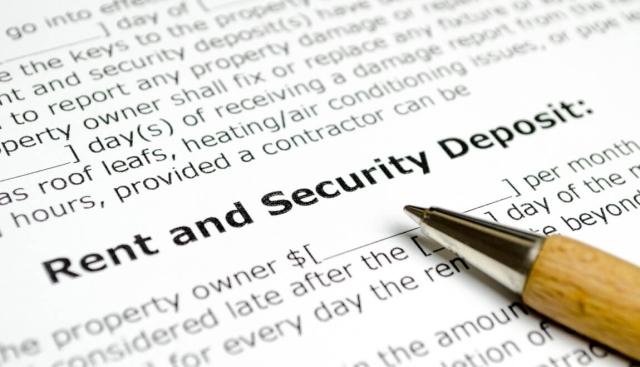A security deposit plays a critical role in establishing a solid lease agreement. Essentially, this deposit, typically equal to one month's rent, is provided to the landlord once your rental application gets approved. It serves to "secure" your tenancy, offering landlords financial protection against rent defaults or damages beyond normal wear and tear.
Your landlord should not view your security deposit as disposable income. It's advisable to inquire about the handling of your security deposit. Ideally, landlords should place these funds in a separate bank account to facilitate an easy return upon your move-out, provided there are no deductions for damages. It's important to note that security deposits should not cover damages from normal wear and tear, which refers to the minor damages expected from daily use of your apartment. For instance, natural wear on hardwood floors and paint is anticipated and inevitable.
Understanding Security Deposit Regulations
Before diving into the specifics of what could cause you to lose your security deposit and how to handle deductions, it’s essential to understand the legal framework surrounding security deposits. Each state in the USA has its own laws governing security deposits, outlining permissible uses, maximum amounts, and requirements for returning deposits.
Legal Requirements and Variations by State
Your rights and obligations regarding security deposits can vary significantly depending on where you live. Some states have strict regulations, while others offer more leeway to landlords. It’s crucial to familiarize yourself with the laws in your state to ensure that both you and your landlord are adhering to legal requirements.
For example, some states dictate the maximum amount a landlord can charge for a security deposit, typically ranging from one to two months’ rent. Others mandate that landlords must keep security deposits in separate, interest-bearing accounts and provide tenants with written notice of where the deposit is being held. Failure to comply with these regulations can result in penalties for the landlord and potential recourse for the tenant.
Prohibited Practices
In addition to specifying how security deposits should be handled, state laws often prohibit certain practices that unfairly disadvantage tenants. For instance, landlords may be prohibited from charging non-refundable "pet fees" or "cleaning fees" in addition to the security deposit.
Both landlords and tenants must understand these prohibited practices to prevent any future legal issues.
What Could Cause You to Lose Your Security Deposit?
As a renter, understanding what could cause you to lose your security deposit is crucial for avoiding unexpected costs and ensuring a smooth transition when it's time to move out. Below are some reasons why you could lose your security deposit:
Not cleaning your rental before moving out
It’s up to you as a renter to ensure you leave your rental as good as you found it when you moved in. In some states, it’s legal for a landlord to use your security deposit to pay for professional cleaning services if you left the apartment or house in a less-than-desirable condition. When it comes to cleaning your rental, after you’ve swept and done all the requisite tidying, focus on cleaning baseboards and removing stains from walls. Pay special attention to areas that may go unnoticed, like the crevices of the shower.
Not giving proper notice
Vacating your rental without proper notice is a surefire way to put your security deposit in jeopardy. Your lease should specify how much notice you have to give your landlord before terminating your lease or not renewing. If you don’t provide ample notice, your landlord may have trouble finding a tenant in time to take over the rental, and in most states, they can take your security deposit to cover any loss of income since you didn’t abide by the lease stipulations.
Unpaid utility bills
There are a couple of cases in which unpaid utilities could be deducted from your security deposit. If collectors can’t charge you and the unpaid bills are addressed to the rental property you’re leaving, your landlord may be held responsible for these unpaid bills. In this case, they can use your deposit to pay the debt. If your utilities were included in rent and you exceeded what could be considered “reasonable use,” meaning you used an excessive amount of water or electricity, your landlord can charge you or use your security deposit when the lease is up for the costs you incurred.
Not paying rent or owing late fees
Using a security deposit to cover unpaid rent is relatively uncommon. For a landlord to cover unpaid rent or late fees with a security deposit, those costs would have to be caused by direct neglect by the tenant. For example, if the rental remains vacant because it was damaged or needs extensive cleaning beyond normal wear and tear, then the cost associated with the vacancy could be covered by the remaining security deposit.
Too many items left behind after move-out
You may be tempted to leave behind furniture or other items you don’t plan on bringing with you to your new apartment, but if those items become the responsibility of your landlord to dispose of, you might lose out on your deposit. You want to leave the rental just as you found it, so if an item wasn’t there when you moved in, take it with you or dispose of it when you leave.
You didn’t document preexisting damages
Move-in and move-out inspections are crucial for protecting yourself against wrongful charges. If you and your landlord failed to catch preexisting damage and you can’t prove it wasn’t your doing with either photos or videos, you might have your security deposit deducted for the preexisting damages.
Unauthorized repairs and alterations to the rental
It’s fun to make your space your own. Most landlords may let you paint or make small additions to your rental that can be easily reversed, but if you’ve made any major changes that your landlord didn’t approve, your security deposit may be used to cover the cost of returning the rental to its original state.
You broke the lease
Lastly, any infraction against your lease that means you must leave your rental and puts your landlord on the hook for covering vacancy on their own dime could lead to you losing your security deposit.
Common Security Deposit Deductions
The most common security deposit deductions usually come when your landlord has to pay for a major cleaning service or item removal. Patching and painting holes in the wall, trash removal, and washing walls are some of the most common deductions you’ll see. Additionally, it’s not uncommon for pet owners to have their security deposit docked because of damages or unique cleaning needs as a result of the pet.
What to Know About Security Deposit Letters
As stated earlier, a landlord can’t prescribe their own price on something that your security deposit is paying for, nor can they deduct it from your deposit without letting you know in writing. Most states require that the security deposit (or deduction letter) be provided to the tenant within 30-45 days; some require less time, so be sure to check your state laws. The service in question needs to be priced by a professional and provided to you to show why that amount is being withheld from your deposit. If your landlord is doing the job themselves, the materials and labor amount need to be provided to you.
Steps to Take When a Landlord Keeps Your Deposit
It can be frustrating not to get a little bit of money back at the end of your lease. If you were at fault for why your security deposit was withheld, there’s not much you can do. Just read your lease carefully next time so you know what to avoid to ensure you get your next deposit back, and make sure you document your move-in and move-out diligently.
If you don’t agree with your landlord’s decision to keep your deposit, you have two routes to take. You can try talking to your landlord. Maybe their withholding of the deposit was a mistake, or maybe they would be willing to let you remedy the situation if it’s a case of leftover items. If that doesn’t work, you can take your landlord to small claims court. You will need evidence that your security deposit was withheld wrongly, so make sure you have a strong case before doing so, such as making sure you have taken photos of the state you left the rental property in before moving out.
Your security deposit is an important part of the leasing puzzle. If you want to make sure you get your security deposit back when it comes time to move out, be sure you read your lease carefully. Give your landlord proper notice before terminating your lease, don’t make any unauthorized repairs, and don’t let any utility bills default. If you think your security deposit won’t be returned in full, make sure your landlord has provided the proper notification letter so you understand why. Happy renting!




